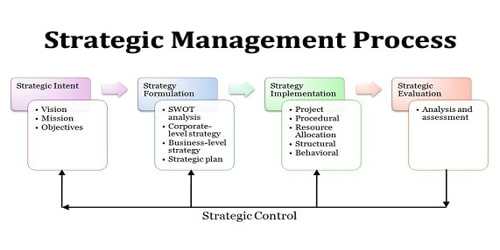Introduction of Strategic Management
Definition: Strategic management is the management of an organization’s resources to achieve its goals and objectives. It involves setting objectives, analyzing the competitive environment, analyzing the internal organization, evaluating strategies and ensuring that management rolls out the strategies across the organization. Strategic management is not static in nature; the models often include a feedback loop to monitor execution and to inform the next round of planning.
Strategic management has two-fold objectives:
- To gain competitive advantage, with an aim of outperforming the competitors, to achieve dominance over the market.
- To act as a guide to the organization to help in surviving the changes in the business environment.
Strategic management can also be defined as a bundle of decisions and acts which a manager undertakes and which decides the result of the firm’s performance. The manager must have a thorough knowledge and analysis of the general and competitive organizational environment so as to take the right decisions.
Strategic management is nothing but planning for both predictable as well as unfeasible contingencies. It is applicable to both small as well as large organizations as even the smallest organization face competition and, by formulating and implementing appropriate strategies, they can attain the sustainable competitive advantage.
It is a continuous process that evaluates and controls the business and the industries in which an organization is involved; evaluates its competitors and sets goals and strategies to meet all existing and potential competitors; and then reevaluates strategies on a regular basis to determine how it has been implemented and whether it was successful or does it needs replacement.

Strategic Management Process: The strategic management process helps company leaders assess their company’s present situation, chalk out strategies, deploy them and analyze the effectiveness of the implemented strategies. The strategic management process involves analyzing cross-functional business decisions prior to implementing them. Strategic management typically involves:
- Analyzing internal and external strengths and weaknesses.
- Formulating action plans.
- Executing action plans.
- Evaluating to what degree action plans have been successful and making changes when desired results are not being produced.
Strategic Management is all about specifying the organization’s vision, mission and objectives, environment scanning, crafting strategies, evaluation and control.
Importance of Strategic Management: The strategic management process is a management technique used to plan for the future: Organizations create a vision by developing long-term strategies. This helps to identify the necessary processes and resource allocation to achieve those goals. It also helps companies strengthen and support their core competencies.
- It guides the company to move in a specific direction. It defines the organization’s goals and fixes realistic objectives, which are in alignment with the company’s vision.
- It assists the firm in becoming proactive, rather than reactive, to make it analyse the actions of the competitors and take the necessary steps to compete in the market, instead of becoming spectators.
- It acts as a foundation for all key decisions of the firm.
- It attempts to prepare the organization for future challenges and play the role of pioneer in exploring opportunities and also helps in identifying ways to reach those opportunities.
- It ensures the long-term survival of the firm while coping with competition and surviving the dynamic environment.
- It assists in the development of core competencies and competitive advantage, that helps in the business survival and growth.
Strategic management actually focuses on assessing the opportunities and threats, keeping in mind the firm’s strengths and weaknesses and developing strategies for its survival, growth and expansion.
Information Source:
















